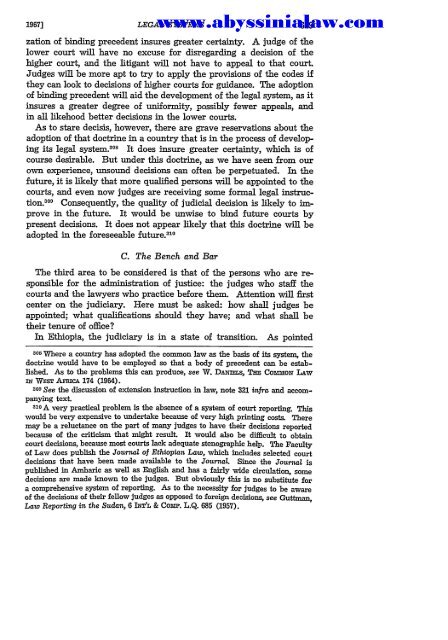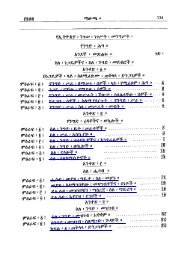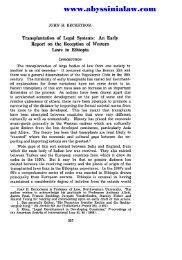Create successful ePaper yourself
Turn your PDF publications into a flip-book with our unique Google optimized e-Paper software.
19671 LEGAL www.abyssinialaw.com<br />
SYSTEMS<br />
zation of binding precedent insures greater certainty. A judge of the<br />
lower court will have no excuse for disregarding a decision of the<br />
higher court, and the litigant will not have to appeal to that court.<br />
Judges will be more apt to try to apply the provisions of the codes if<br />
they can look to decisions of higher courts for guidance. The adoption<br />
of binding precedent will aid the development of the legal system, as it<br />
insures a greater degree of uniformity, possibly fewer appeals, and<br />
in all likehood better decisions in the lower courts.<br />
As to stare decisis, however, there are grave reservations about the<br />
adoption of that doctrine in a country that is in the process of developing<br />
its legal system. 3 8 It does insure greater certainty, which is of<br />
course desirable. But under this doctrine, as we have seen from our<br />
own experience, unsound decisions can often be perpetuated. In the<br />
future, it is likely that more qualified persons will be appointed to the<br />
courts, and even now judges are receiving some formal legal instruction.<br />
30 9 Consequently, the quality of judicial decision is likely to improve<br />
in the future. It would be unwise to bind future courts by<br />
present decisions. It does not appear likely that this doctrine will be<br />
adopted in the foreseeable future. 310<br />
C. The Bench and Bar<br />
The third area to be considered is that of the persons who are responsible<br />
for the administration of justice: the judges who staff the<br />
courts and the lawyers who practice before them. Attention will first<br />
center on the judiciary. Here must be asked: how shall judges be<br />
appointed; what qualifications should they have; and what shall be<br />
their tenure of office?<br />
In Ethiopia, the judiciary is in a state of transition. As pointed<br />
308 Where a country has adopted the common law as the basis of its system, the<br />
doctrine would have to be employed so that a body of precedent can be established.<br />
As to the problems this can produce, see W. DArnELS, THE ComThooN LAw<br />
3N WEsT AnuxCA 174 (1964).<br />
309<br />
See the discussion of extension instruction in law, note 321 infra and accompanying<br />
text.<br />
310 A very practical problem is the absence of a system of court reporting. This<br />
would be very expensive to undertake because of very high printing costs. There<br />
may be a reluctance on the part of many judges to have their decisions reported<br />
because of the criticism that might result. It would also be difficult to obtain<br />
court decisions, because most courts lack adequate stenographic help. The Faculty<br />
of <strong>Law</strong> does publish the Journal of Ethiopian <strong>Law</strong>, which includes selected court<br />
decisions that have been made available to the Journal. Since the Journal is<br />
published in Amharic as well as English and has a fairly wide circulation, some<br />
decisions are made known to the judges. But obviously this is no substitute for<br />
a comprehensive system of reporting. As to the necessity for judges to be aware<br />
of the decisions of their fellow judges as opposed to foreign decisions, see Guttman,<br />
<strong>Law</strong> Reporting in the Sudan, 6 INT'L & Comp. L.Q. 685 (1957).





